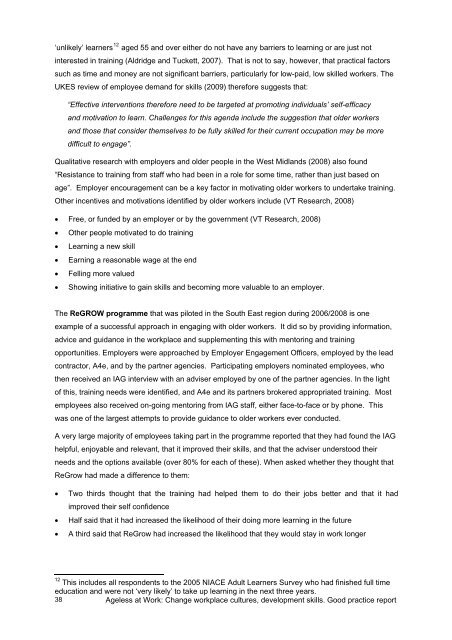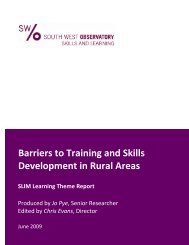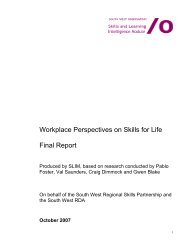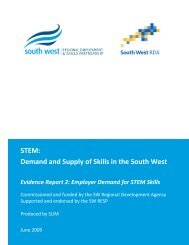Ageless at Work - Skills for Care
Ageless at Work - Skills for Care
Ageless at Work - Skills for Care
You also want an ePaper? Increase the reach of your titles
YUMPU automatically turns print PDFs into web optimized ePapers that Google loves.
‘unlikely’ learners 12 aged 55 and over either do not have any barriers to learning or are just not<br />
interested in training (Aldridge and Tuckett, 2007). Th<strong>at</strong> is not to say, however, th<strong>at</strong> practical factors<br />
such as time and money are not significant barriers, particularly <strong>for</strong> low-paid, low skilled workers. The<br />
UKES review of employee demand <strong>for</strong> skills (2009) there<strong>for</strong>e suggests th<strong>at</strong>:<br />
“Effective interventions there<strong>for</strong>e need to be targeted <strong>at</strong> promoting individuals’ self-efficacy<br />
and motiv<strong>at</strong>ion to learn. Challenges <strong>for</strong> this agenda include the suggestion th<strong>at</strong> older workers<br />
and those th<strong>at</strong> consider themselves to be fully skilled <strong>for</strong> their current occup<strong>at</strong>ion may be more<br />
difficult to engage”.<br />
Qualit<strong>at</strong>ive research with employers and older people in the West Midlands (2008) also found<br />
“Resistance to training from staff who had been in a role <strong>for</strong> some time, r<strong>at</strong>her than just based on<br />
age”. Employer encouragement can be a key factor in motiv<strong>at</strong>ing older workers to undertake training.<br />
Other incentives and motiv<strong>at</strong>ions identified by older workers include (VT Research, 2008)<br />
Free, or funded by an employer or by the government (VT Research, 2008)<br />
Other people motiv<strong>at</strong>ed to do training<br />
Learning a new skill<br />
Earning a reasonable wage <strong>at</strong> the end<br />
Felling more valued<br />
Showing initi<strong>at</strong>ive to gain skills and becoming more valuable to an employer.<br />
The ReGROW programme th<strong>at</strong> was piloted in the South East region during 2006/2008 is one<br />
example of a successful approach in engaging with older workers. It did so by providing in<strong>for</strong>m<strong>at</strong>ion,<br />
advice and guidance in the workplace and supplementing this with mentoring and training<br />
opportunities. Employers were approached by Employer Engagement Officers, employed by the lead<br />
contractor, A4e, and by the partner agencies. Particip<strong>at</strong>ing employers nomin<strong>at</strong>ed employees, who<br />
then received an IAG interview with an adviser employed by one of the partner agencies. In the light<br />
of this, training needs were identified, and A4e and its partners brokered appropri<strong>at</strong>ed training. Most<br />
employees also received on-going mentoring from IAG staff, either face-to-face or by phone. This<br />
was one of the largest <strong>at</strong>tempts to provide guidance to older workers ever conducted.<br />
A very large majority of employees taking part in the programme reported th<strong>at</strong> they had found the IAG<br />
helpful, enjoyable and relevant, th<strong>at</strong> it improved their skills, and th<strong>at</strong> the adviser understood their<br />
needs and the options available (over 80% <strong>for</strong> each of these). When asked whether they thought th<strong>at</strong><br />
ReGrow had made a difference to them:<br />
<br />
<br />
<br />
Two thirds thought th<strong>at</strong> the training had helped them to do their jobs better and th<strong>at</strong> it had<br />
improved their self confidence<br />
Half said th<strong>at</strong> it had increased the likelihood of their doing more learning in the future<br />
A third said th<strong>at</strong> ReGrow had increased the likelihood th<strong>at</strong> they would stay in work longer<br />
12 This includes all respondents to the 2005 NIACE Adult Learners Survey who had finished full time<br />
educ<strong>at</strong>ion and were not ‘very likely’ to take up learning in the next three years.<br />
38<br />
<strong>Ageless</strong> <strong>at</strong> <strong>Work</strong>: Change workplace cultures, development skills. Good practice report








